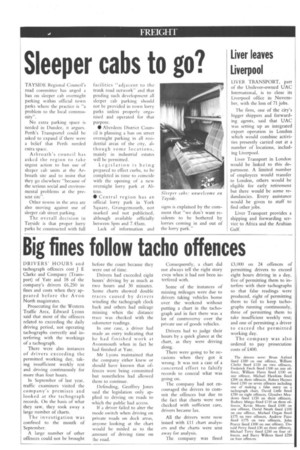Big fines follow tad° offences
Page 16

If you've noticed an error in this article please click here to report it so we can fix it.
DRIVERS' HOURS and tachograph offences cost J E Clarke and Company (Transport) of Yate and 18 of the company's drivers £6,250 in fines and costs when they appeared before the Avon North magistrates.
Prosecuting for the Western Traffic Area, Edward Lyons said that most of the offences related to exceeding the daily driving period, not operating tachographs correctly and interfering with the workings of a tachograph.
There were also instances of drivers exceeding the permitted working day, taking insufficient weekly rest and driving continuously for more than four hours.
In September of last year, traffic examiners visited the company's premises and looked at the tachograph records. On the basis of what they saw, they took away a large number of charts.
The investigation was confined to the month of September.
A large number of other offences could not be brought before the court because they were out of time.
Drivers had exceeded eight hours' driving by as much as two hours and 30 minutes. Some charts showed double traces caused by drivers winding the tachograph clock back and others had mileage missing when the distance trace was checked with the odometer readings.
In one case, a driver had made an entry indicating that he had finished work at Avonmouth when in fact he had finished at Yate.
Mr Lyons maintained that the company either knew or should have known that offences were being committed but nonetheless had allowed them to continue.
Defending, Geoffrey Jones said the legislation only applied to driving on roads to which the public had access.
If a driver failed to alter the mode switch when driving on private roads on dock areas, anyone looking at the chart would be misled as to the ,amount of driving time on the road.
Consequently, a chart did not always tell the right story even when it had not been interfered with.
Some of the instances of missing mileages were due to drivers taking vehicles home over the weekend without putting a chart in the tachograph and in fact there was a lot of controversy over the private use of goods vehicles.
Drivers had to judge their hours by a quick glance at the chart, as they were driving along.
There were going tube occasions when they got it wrong. It was not a case of a concerted effort to falsify records to conceal what was going on.
The company had not encouraged the drivers to commit the offences but due to the fact that charts were not checked with sufficient care, drivers became lax.
All the drivers were now
issued with chart analysers and the charts were sent away for analysis.
The company was fined £3,000 on 24 offences of permitting drivers to exceed eight hours driving in a day, five of permitting them to interfere with their tachographs • so that false readings were produced, eight of permitting them to fail to keep tachographs running continuously, three of permitting them to take insufficient weekly rest; and one of permitting a driver to exceed the permitted working day.
The company was also ordered to pay prosecution costs of £400.
The drivers were: Brian Axford tined £100 on one offence, William Clarke fined £110 on two offences, Frederick Finch fined £100 on one offence, William Hares fined £100 on one offence, Michael Hawkins fined £200 on three offences, Robert Haynes fined £350 on seven offences including one of making a false entry on a tachograph chart, David Little fined £350 on eight offences, Clyndwr Meadows fined £150 on three offences, Rodney Mingo fined £110 on three offences, Kevin Moorefined £100 on one offence, David Neath fined £100 on one offence, Michael Organ fined £175 on two offences, Andrew Paice fined £175 on two offences, John Pearce fined £100 on one offence, Donald Perry fined £30 on three offences, Michael Terry fined £250 on four offences, and Barry Willcox fined £250 on four offences.




































































































